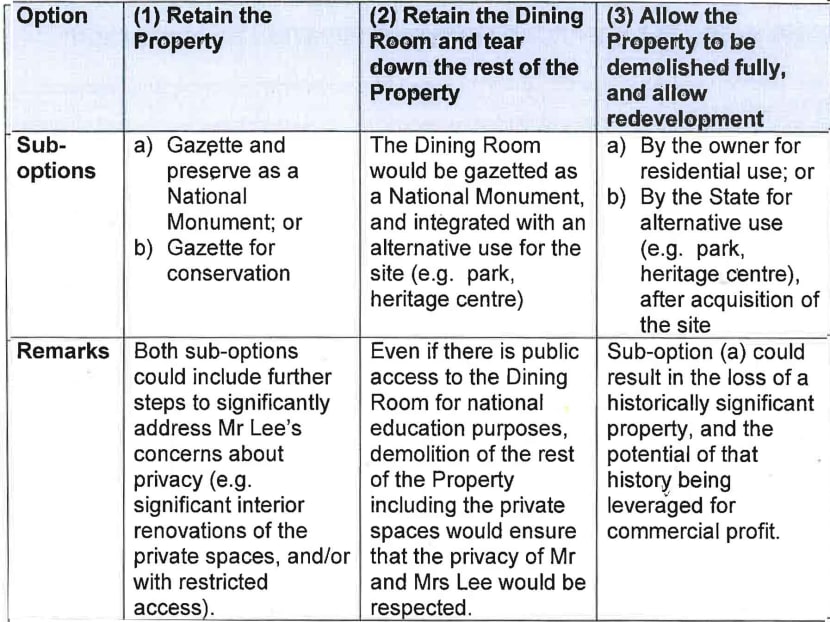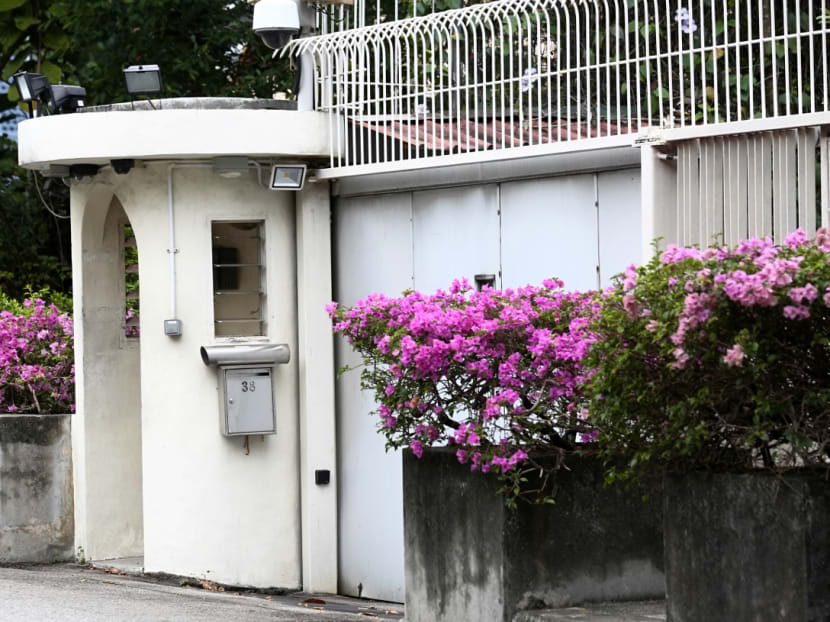3 options for 38 Oxley Road, but no decision needed now: Ministerial committee
SINGAPORE — About two years after it was set up to weigh various options for the family home of late founding Prime Minister Lee Kuan Yew, a ministerial committee has laid out three possibilities for the property at 38 Oxley Road, ranging from gazetting it as a National Monument, to letting it be fully demolished and redeveloped.
SINGAPORE — About two years after it was set up to weigh various options for the family home of late founding Prime Minister Lee Kuan Yew, a ministerial committee has laid out three possibilities for the property at 38 Oxley Road, ranging from gazetting it as a National Monument, to letting it be fully demolished and redeveloped.
However, in a report released on Monday (April 2), the committee, led by Deputy Prime Minister Teo Chee Hean, said it had not made any recommendation.
No immediate decision on the property is warranted as Mr Lee’s daughter, Dr Lee Wei Ling, is likely to continue residing in the single-storey bungalow “for the foreseeable future”, the committee said.
It added that it relied on the "objective evidence" as well as the "key concrete steps" taken by Mr Lee Kuan Yew himself during his lifetime to guide its views on this matter. Some of the steps the founding Prime Minister had taken to put his wishes into effect included putting the demolition clause in his last will, his letter to Cabinet dated Dec 27, 2011, as well as the renovation/redevelopment plans for 38 Oxley Road which he submitted to the URA in March 2012, and obtained approval for.
The committee, however, noted that “the various options outlined in this report are drawer plans to help a future Government make an informed and considered decision about the property when it becomes necessary”.
The fate of the property came under the spotlight in June last year after Dr Lee and Mr Lee Hsien Yang — the younger siblings of Prime Minister Lee Hsien Loong — alleged in a six-page statement that they felt “threatened” in their attempt to carry out their late father’s wish to demolish the house, where Mr Lee Kuan Yew had lived since the 1940s until his death in March 2015.
The public dispute also prompted a two-day parliamentary debate last July where PM Lee delivered a Ministerial Statement debunking the allegations levelled against him by his siblings.
In its 21-page report made public on Monday, the committee said that while Mr Lee Kuan Yew’s preference was for the property to be demolished, he was also “prepared to accept options other than demolition”, provided that arrangements were made to ensure that the house was kept in a habitable state, and the family’s privacy was protected.
In his last will drafted in December 2013, Mr Lee Kuan Yew set out his wish for the property to be “demolished immediately after (his) death” or after Dr Lee moves out. However, the same clause also states that if his children are unable to demolish the property “as a result of any changes in the law, rules or regulations binding them”, it should not be open to public.
In working out the possible plans for the house, the committee also assessed that it has architectural, heritage and historical significance.

One option would be to preserve the property as a national monument, which would involve the state’s legal acquisition of the house a year before the date of the preservation order. The Government will also need to identify an appropriate alternative to residential use for the site, such as a museum or research entity.
Under the Planning Act, an owner has the right to appeal against a decision to conserve the property, but the final decision rests with the National Development Minister.
38 Oxley Road was initially bequeathed to Mr Lee Hsien Loong, but he transferred ownership of the house to Mr Lee Hsien Yang at market value in 2015. Both brothers then each donated half the value of the house to charity.
Another way to retain the property is through conservation, which does not confer the same national significance as preservation, but allows greater flexibility for modifications to the property, said the committee.
Under this option, the owner can continue to live in the property, undertake modifications — the committee feels which would “significantly address Mr Lee’s concerns about privacy” — or even sell it.
Conservation could also be an interim step towards preserving the property as a National Monument, as was the case for Istana Kampong Glam and the Fullerton Hotel.
A second option is to retain the dining room at the basement — assessed to be the “most historically significant” part of the property — and allow the rest of the property to be torn down and redeveloped.
It was in this room that the People’s Action Party was formed in 1954, and key decisions that came to shape Singapore’s future were discussed and made.
The committee wrote: “This is one way to fulfil Mr Lee’s wishes to tear down the building, and still retain the most historically significant part of the house, although there may be a loss of context in preserving a room alone with the rest of the property.”
A third option is for the property to be demolished and redeveloped by the owner for residential use.
Alternatively, the state can acquire the land, demolish the property and redevelop it for an alternative use, such as a public park, heritage centre or research entity. In the event that the site is acquired by the state, there is also an option to amalgamate it with adjacent state land to provide a larger footprint for redevelopment.
The committee noted that demolition could result in the loss of a historically significant property and the potential of that “history being leveraged for commercial profit”.
The committee felt it “owed it to Singaporeans” to make its findings public, after its work was thrust into the spotlight last year, said Mr Teo.
He said: “Ultimately, in the fullness of time, a future Government will have the responsibility to consider the public interest aspects of the property, taking into account Mr Lee’s wishes. They will have to decide what to do with the property and be able to carry the decision … With this, we hope to close the chapter on this topic, and focus on other pressing national issues ahead of us.”
PM LEE ACCEPTS COMMITTEE'S CONCLUSION ON HIS FATHER'S WISHES REGARDING 38 OXLEY ROAD
Prime Minister Lee Hsien Loong said he accepts the ministerial committee’s conclusion on the late Mr Lee Kuan Yew’s wishes regarding their family home at 38 Oxley Road, and the options it has laid out.
The committee, led by Deputy Prime Minister Teo Chee Hean, sketched out three possibilities for the bungalow, ranging from gazetting it as a National Monument, to letting it be fully demolished and redeveloped, but did not make any recommendation.
The committee, formed in June 2016, released its 21-page report on Monday (April 2).
Posting on Facebook shortly after the report was released, Mr Lee Hsien Loong – who recused himself from the matter – reiterated the committee’s point that there is no need to make any immediate decision regarding the property.
“Speaking as a son, I accept the Committee’s conclusion on what my father’s wishes were regarding the house at 38 Oxley Road, and the range of options it has laid out,” he wrote.
“My sister is still living there, and is likely to continue doing so for the foreseeable future. I hope that when the time comes to decide on what to do with the house, this report will help the Government of the day to make an informed decision that both respects my father’s wishes and is in the public interest,” he wrote.
When approached, his younger brother Mr Lee Hsien Yang told TODAY on Monday that he would look at the committee’s report and discuss it with their sister, Dr Lee Wei Ling, before deciding if they would issue a response.
The fate of the property came under the spotlight in June last year after Dr Lee and Mr Lee Hsien Yang alleged in a six-page statement that they felt “threatened” in their attempt to carry out their late father’s wish to demolish the house, where Mr Lee Kuan Yew had lived from the 1940s until his death in March 2015.
They also said that they no longer trusted their elder brother and have lost confidence in him as a leader.
Commenting on the committee’s findings, Member of Parliament for Chua Chu Kang Group Representation Constituency Zaqy Mohamad said the situation is an “open-ended paper” as no action is warranted at this point in time.
However, it is important to see how the Lee family members respond to the findings, he noted.
“I hope that when a decision is eventually made, in the future, it is one which both the Lee family and the Government can come to a compromise on,” he said. KELLY NG AND KENNETH CHENG







